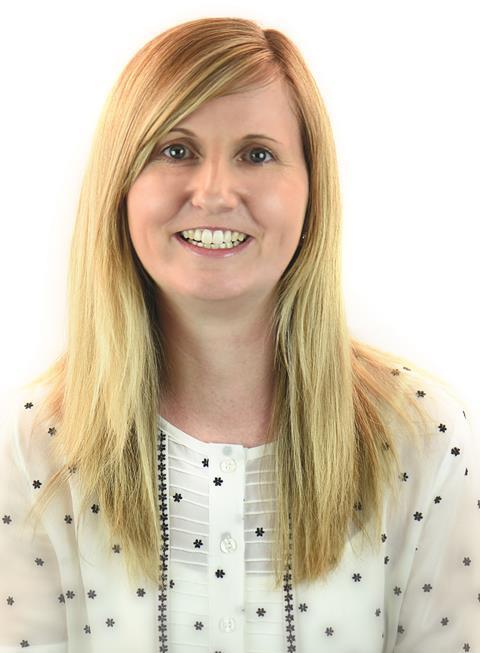In 2015, Sternberg Reed introduced a career development programme to incentivise existing staff, bolster recruitment and retention, and support succession planning. Frances Anderson explains how the programme works in practice
Recruiting and retaining quality staff is essential to the success or failure of firms of all sizes. Career progression has always been key to that goal, but it is now more important than ever, with an increasingly fluid jobs market and young people entering the profession with a different outlook to previous generations.
I was promoted to senior associate in February 2017 … just 15 months after I began the process
Yvonne Snow, Sternberg Reed
Sternberg Reed is a medium-sized high street firm with four offices across east London and Essex. We do both private client and legal aid work, and like many firms, we want to find ways of attracting the very best we can in terms of new recruits.
As Sternberg Reed’s head of operations, I am really proud of the focus the firm puts on staff development. In 2017, we won the Excellence in Training and Development award at the Law Society’s 2017 Excellence Awards in recognition of our associate and partner development programme, which has already driven real change at the firm.
The programme was devised by Kelly Rotheram, our firm’s CEO, formerly of Russell Jones Walker. Kelly moved to Sternberg Reed in 2013. I am in charge of recruitment and staff development. Kelly and I believe that, together, we have found an effective way of attracting and retaining new talent into a high street firm.
In this article, I explain how the programme works, why and how we introduced it, and what successes we’ve had so far.
The first steps
After Kelly moved to Sternberg Reed from the large City firm she had previously worked in, she recognised that providing clear career progression was as important in a high street practice as in a City firm. And there was an additional need which is actually more important in a smaller firm: the issue of succession.
Small to medium-sized high street practices run in a traditional partnership model often overlook the crucial issue of succession. Larger firms have ‘by definition’ a bigger pool of potential future partners to choose from, and City firms have the added benefit of being able to offer high salaries to potential partners of the future to attract them into the firm. Many small and medium-sized firms need to think more strategically, as they have fewer potential staff to choose from and cannot compete with City salaries. Many have the added disadvantage of a very small group of equity partners (or members, in the case of LLPs). Such firms may be heavily reliant on the personality of a small group of key individuals.
We realised that there was no quick fix here: we needed quality candidates to be recruited and retained at all levels, and we needed to motivate existing staff with real potential to improve and stretch themselves, with the ultimate aim of creating equity partners of the future. Kelly realised that the structures in place in a large firm to support career development could be replicated in a smaller practice. She discussed her ideas with me and I fully supported the idea. We then consulted with potential candidates for the programme to test the idea. We received a positive response, so we chose to present the idea to the partnership group.
Securing buy-in
Getting partner support was crucial before the programme could be rolled out. There was concern among partners that a large number of people would be promoted, meaning that the firm would quickly become top-heavy.
Providing clear career progression is as important in a high street practice as in a City firm
However, the reality is that career progression is not for everyone, and those who do apply often only want to progress to the next level of seniority. The demands of partnership and the skills needed for it mean that only those who are really driven will embark on this stage of the process. The process is also not quick. Programmes last at least 12 to 18 months, with some levels of development taking far longer. Where candidates are identified for fast-tracking, they still need to meet all the required core competencies and achieve goals set for them, before they can progress.
Another key point for partners was that they retained control of deciding who would become future partners. It was agreed that partners would decide whether someone should be allowed onto the programme, and that once an individual had met the required standard, partners would also ratify any promotion.
How the programme works
We introduced the programme in 2015. It is competency based: it requires a base level of competencies for each level of the programme. Applicants have to prove themselves worthy of being allowed onto the programme by meeting these base competencies. As staff progress towards partnership, more is expected of them and the goals set become more challenging.
The programme is very much candidate-driven: we do not spoon-feed candidates, but lead the pace at which they develop, with the help of a mentor, who will be chosen for their skills in the chosen career pathway.
We organise a rolling training programme focused on those on the programme and looking to develop skills often far removed from the traditional legal updates we all know so well. We recognise that good lawyers and support staff have a wide range of skills which can be tapped into for personal career progression, and also contribute to the growth and financial success of the firm. This includes but is not limited to marketing, staff management and technical expertise.
Recent training sessions have included interview techniques for interviewers, employment law updates for managers, marketing skills, and Myers Briggs personality tests allowing staff at all stages of the programme to review their own personality types and also those of their team members.
How we select mentors
One of the key elements of the programme is regular meetings between candidates and mentors. Mentors will review progress with the member of staff and discuss any problems that have arisen in meeting the goals set.
We do not spoon-feed candidates, but lead the pace at which they develop, with the help of a mentor
The mentors may be technical experts – they are often equity partners who have achieved recognition in their own field of law. However, we look beyond the partner group. I, for instance, as an experienced people manager, am currently mentoring one of the associate partners who is on the fixed equity programme. We have formal meetings approximately every three months to discuss any staff issues in his department, and I’m on hand to discuss appraisals and any disciplinary issues as they arise. My mentee is already a technical expert, but it was identified that development of his staff management expertise must be as important as his technical knowledge if the department is to grow and succeed.
Another staff manager mentor is the head of one of our largest departments, who is developing a senior associate in her department on the associate partner programme. As part of her development, the senior associate has taken on all recruitment responsibility. She meets regularly with her mentor to receive hands-on guidance about staffing issues. She has also been given responsibility for supervision of all paralegals in the department. This frees up the head of department to deal with other management areas, while also allowing the senior associate to develop her skills and move towards achieving her programme goals.
We also have mentors in marketing. These mentors have been chosen for their track record in promoting the firm and other non-legal skills. We have both lawyer and non-lawyer marketing mentors, and they guide those on the programme in working with bulk referrers, engaging new leads and developing networking skills.
A success story: from assistant solicitor to senior associate

Yvonne Snow is a senior associate in Sternberg Reed’s family department. She completed the senior associate stage of the programme in 2017 and, in 2018, was accepted onto the associate partner programme.
I joined Sternberg Reed as an assistant solicitor in June 2013, following a three-year period with another law firm in Essex. I deal with private clients and legal aid clients.
When the associate and partner development programme was introduced in 2015, I was really keen to take part. From my point of view, it was really positive that there was a clear and achievable programme in place to allow people to progress within the firm.
I applied for the programme, and was accepted on to the staff manager pathway. My mentor set a series of objectives and provided invaluable guidance and support on how to achieve them. She was always available to deal with any queries or issues I had, and I was given fantastic opportunities to deal with the management of staff.
Throughout the programme, regular in-house training was offered, too. The training was very beneficial and certainly assisted in our achieving the competencies required to be met for each pathway.
I was promoted to senior associate in February 2017, when I had achieved the specific competencies for the pathway. This was just 15 months after I began the process.
Having this programme within the firm is a great source of motivation, as there are clear and attainable targets to be reached in order to progress, and we are supported in our pursuit of our career progression goals.
The story so far
Since 2015, four solicitors have been promoted to a variety of levels, including: from assistant solicitor to associate; from associate to senior associate; and from senior associate to associate partner. One candidate was recruited and fast-tracked to fixed equity partner level. Of these four, two have joined the next stage of the programme. We currently have five employees on the programme. For a personal story from one of our candidates, see the box above.
We’ve seen other benefits, too. The firm has had recognition from a number of recruiters at agencies, who say potential candidates are really interested to hear about the programme. Recruitment at more senior levels is far easier now the programme is in place: the programme was crucial in securing a senior key recruitment very early on. Many candidates who have five years’ or more PQE are looking to the future and making decisions based on whether their next move could provide them with real career development opportunities.
We have a very positive outlook for the future of the firm, which in part is led by the key individuals recruited at head of department level since the programme was started. While our equity partner heads of department are beyond the scope of the scheme, all other heads of department have either been on or are currently on the development programme.
Looking ahead
Since we introduced the programme, we have also adapted and overhauled our competency-based appraisal system for all levels of staff, including equity partners.
Looking ahead, we intend to adapt the basic elements of the scheme to create a more detailed student placement scheme and apprenticeship programmes, and to enhance the trainee programme.















